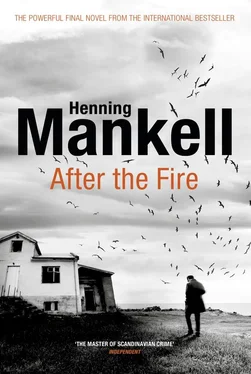She wasn’t handcuffed, and the officer made no attempt to stop me from hugging her.
‘You came,’ Louise said.
‘Of course I came.’
‘In my life people don’t usually come when I need them.’
I introduced her to Olof Rutgersson. The police officer had stationed herself by the door and seemed to have no interest in our conversation. We sat down at the table, and Louise immediately began to tell us what had happened.
She admitted stealing the wallet on the crowded train. I no longer had any doubt that this was how she made her living, but she was prepared to admit only this one incident. I had some sympathy with her; why should she reveal to Rutgersson that her principal source of income was whatever she managed to steal? We had established a tacit mutual understanding. She had been arrested for the theft of this one wallet, nothing else.
‘Are you so short of money?’ Rutgersson asked when she fell silent.
Once again I changed my mind about him. I had thought he was an energetic and efficient embassy official; now I saw a remarkably insensitive individual sitting beside me.
‘Why else would she have stolen a wallet?’ I said. ‘Don’t forget she’s pregnant, and that her inheritance, my house in Sweden, burned to the ground just a few weeks ago.’
Rutgersson looked at me in surprise, and I realised I hadn’t mentioned my house. I told him the story, and he nodded to himself.
‘We’ll sort out legal representation for you,’ he said. ‘Unfortunately the embassy can’t cover the cost, but we can advance you the money for the time being.’
‘Will it be expensive?’ I asked.
‘Not necessarily.’
‘Then I’ll pay.’
He nodded and took out his phone, but there was no signal deep in the bowels of the building. He exchanged a few words with the officer, who let him out. I heard his footsteps hurrying up the stairs as he sought daylight and a phone signal.
I took my daughter’s hand. I wasn’t used to doing such a thing. For the first time since that day almost ten years ago, when Harriet had told me that the woman standing in the doorway of her caravan in the forests of Hälsingland was my daughter, I actually felt as if she was.
I wished that Harriet was still alive, able to see that at long last Louise and I had found one another.
I asked her how she was feeling. I asked about the baby. She answered quietly that everything was fine. Eventually I couldn’t avoid asking why she hadn’t turned up for lunch that day, why she had simply left a note under my windscreen wiper.
‘I just needed to get away.’
I left it there. Her response made it clear that she didn’t want to tell me why she had suddenly taken off.
We got quite close while Rutgersson was upstairs chasing a phone signal. I felt I understood my daughter better than I had in the past; she was running away, but nothing more.
I had one more question.
‘You called me. Did you call anyone else?’
‘No.’
‘Why me? Of course it was absolutely the right thing to do, but just a few days earlier you’d gone off and left me without a word.’
‘There’s no one else I can ask for help.’
‘You’ve always said you have a lot of friends.’
‘That might not be true.’
‘Why would a person lie about something like that?’
‘I have no idea what other people do, but I don’t always tell the truth. Just like you.’
I could tell from her voice that she didn’t want to continue the conversation. We’d gone this far but no further. She had called me. No one else.
Rutgersson returned; there was something weasel-like about the way he moved. He brandished the phone as if it were a gun. He always seemed to be in a hurry.
‘Madame Riveri will take on your case,’ he said before the police officer had time to close the door behind him. ‘She’s helped us out in the past; on three separate occasions she’s managed to get Swedish citizens out of tricky situations. We can safely leave matters with her.’
He shook hands with Louise and wished her luck.
‘Unfortunately I can’t stay,’ he said. ‘I have a meeting at the embassy. But Madame Riveri will keep me informed.’
He left the room, and I could hear his footsteps dashing up the stairs.
‘He’s been a great help,’ I said.
‘I’m glad he’s not the father of my child,’ was Louise’s response.
I didn’t understand what she meant. Or perhaps I did.
Madame Riveri was about fifty years old and elegantly dressed. She moved and talked in a relaxed manner which left no one in any doubt about her opinion of her own ability in legal affairs. With a firm gesture she dismissed the female officer and took a notebook out of her bag. When she realised that Louise’s French wasn’t good enough to sustain a meaningful discussion, she switched to English. I now heard in detail how Louise had travelled around on the Metro looking for a suitable victim. Madame Riveri wanted to know exactly where and when she had boarded the first train, where she had changed and why she had chosen that particular man as her target. The way Louise answered convinced me that she trusted Madame Riveri.
They spoke about the baby, but the identity of the father wasn’t mentioned. Finally Madame Riveri asked if this was the first time Louise had committed a crime. She said it was, but I could see that the other woman didn’t believe her. Louise’s dexterity spoke of a great deal of practice over a long period.
‘What you have just told me is not true, of course. However, it will help our case if you are a first-time offender who just happened to get caught.’
Madame Riveri snapped her leather-bound notebook shut and slipped it into her bag.
‘I would ask you not to speak to anyone unless I am present,’ she said. ‘We’ll have you out of here in a couple of days, three at the most. I doubt if it will be sooner, but it is possible.’
She got to her feet, shook Louise’s hand then nodded to indicate that she wanted me to accompany her. The police officer escorted Louise away and I trotted up the stairs after Madame Riveri; she was moving so fast that I found it difficult to keep up. When we were out on the street and the heavy door had closed behind us, she gave me her card.
‘I’ll pay whatever it costs, of course,’ I said.
She gave me an ironic smile. ‘Indeed,’ she said. ‘But we don’t need to discuss that at the moment.’
I wanted to find out what was going to happen next, but she hailed a cab and disappeared without even saying goodbye.
I set off for my hotel. There was rain in the air. I stopped on the bridge over the Seine and watched a barge as it passed beneath me. A woman was hanging out washing, and there was a pram anchored to the deck. I jumped when someone tapped me on the shoulder. I turned and looked straight into a dirty, unshaven face. When the man asked me for money, there was no avoiding his bad breath. I gave him a euro and walked away.
I remembered my father confiding his great fear: he was terrified that one day he would be unable to pay his bills and would end up living on the street. I never understood why he told me that. Perhaps he wanted to warn me? But I was careful and always made sure I had money put aside in case of something unexpected.
When I reached the hotel, Monsieur Pierre was back with his warm smile. I went into the bar and had a cup of tea as a change from all that coffee before taking the lift up to my room.
I had just lain down on the bed when my telephone rang. It was Madame Riveri; she had arranged an appointment with the magistrate’s court for the following day to request that Louise be released and deported from France. She wanted to know if I would be able to pay for my daughter’s flight to Sweden; I told her that wasn’t a problem.
Читать дальше












